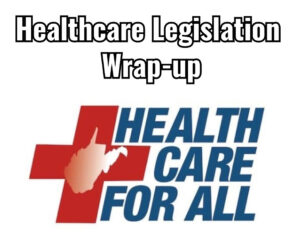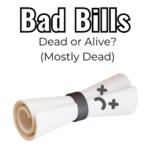- Like
- Digg
- Del
- Tumblr
- VKontakte
- Buffer
- Love This
- Odnoklassniki
- Meneame
- Blogger
- Amazon
- Yahoo Mail
- Gmail
- AOL
- Newsvine
- HackerNews
- Evernote
- MySpace
- Mail.ru
- Viadeo
- Line
- Comments
- Yummly
- SMS
- Viber
- Telegram
- Subscribe
- Skype
- Facebook Messenger
- Kakao
- LiveJournal
- Yammer
- Edgar
- Fintel
- Mix
- Instapaper
- Copy Link
By Kim Jones, Coordinator, Health Care for All WV
The 2024 West Virginia Legislative session is over. 2,575 total bills were introduced, 280 bills passed both the Senate and House to become completed legislation and are headed to Governor Justice’s desk. But there are two bills that many are calling on the Governor to veto. One is SB 841, which cuts unemployment benefits. The other, HB 5105, creates exemptions for childhood immunizations in private, parochial, and virtual public schools. HB 5105 was one of 20 bills introduced this year that would weaken our ability to protect our students, their families and our communities from nearly-eradicated diseases like polio, rubella and measles. With measles outbreaks happening around the country, medical professionals are calling on the Governor to veto the bill.
There is still a chance to protect West Virginia families from both of these damaging bills. Please reach out to Jim Justice TODAY to veto the unemployment bill here. And ask him to veto the vaccination bill here. Thank you!
The other standouts among health care bills that passed this year was HB 4933, which changed dental benefits for adult Medicaid recipients from $1,000 a year to $2,000 over two years. This bill solved the problem of people being able to get dentures, which usually cost around $1,200, without raising state Medicaid spending.
SB 453 will require pricing and payment transparency from pharmacy benefit managers who contract with PEIA.
With West Virginia babies and mothers at a high risk of dying during or after birth, HB 4874 was passed to change how the infant and maternal mortality panels can access information about fatalities to improve our understanding, including being allowed to question family members when reviewing what lead to a death.
The best news at the end of the session might be the bills that didn’t pass. The inappropriately named “Women’s Bill of Rights” failed to pass Saturday night. This bill is one in a long line of legislation that takes aim at trans and non-binary people, by codifying definitions of “man” and “woman”.
Another attack on the LGBTQ+ community failed to be taken up by the Senate. That bill would have expanded limitations created by a bill that passed last year targeting the provision of gender-affirming care to minors with severe gender dysphoria. Parents have spent two years pleading with our legislators to protect these vulnerable kids from self-harm and suicide that can accompany unaddressed gender dysphoria. We are so grateful that many of our legislators listened.
A bill designed to impose work requirements on recipients of SNAP, the federal food assistance program, also died. It would have resulted in thousands of West Virginia families going hungry and children going without vital nutrition.
Among many others, we are especially pleased to see two very detrimental education bills die. One would have allowed school staff members to carry guns in public schools, which, like the college campus carry bill that passed last year, is just another piece of NRA-driven legislation that we feel poses a significant danger to students and staff. Additionally, a very punitive school discipline bill aimed at students as young as 5, and that would address the trauma and mental health needs that so many of our students face with suspension, died on the last night of the session as slightly different versions bounced back and forth between the House and the Senate. SB 614 would have barred students who were removed from the classroom from riding the school bus home, and if the families couldn’t arrange transportation to get the student home, the police would be called. One amendment that came up a number of times was to automatically call CPS on the student and charge the parents with child abandonment. Childhood trauma and mental health needs should be addressed through therapeutic means, not punishment.
Finally, the “flat” budget passed on the last night of the session, failed to fill the $114 million dollar gap in Medicaid funding. And the bill that would ensure that Medicaid was funded in the future with a tax on Managed Care Organizations (MCOs) passed the House only to die undiscussed on the desk of Eric Tarr, the chair of Senate Finance. Senator Tarr also added an amendment to the budget bill at the last minute that slashed funding the state needed to care for our people with disabilities (read more about that here). There is ongoing discussion that the legislature will reconvene in May to further discuss the budget.







